人教版英语最新六年级上册复习资料
(人教版)PEP小学英语六年级上册复习资料
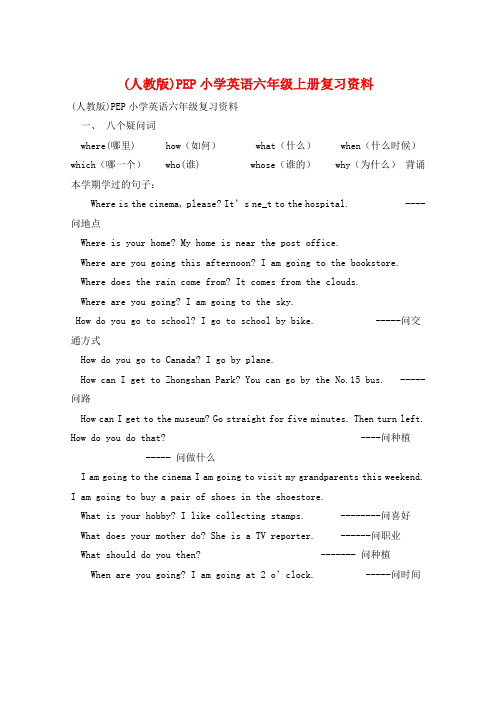
(人教版)PEP小学英语六年级上册复习资料(人教版)PEP小学英语六年级复习资料一、八个疑问词where(哪里) how(如何) what(什么) when(什么时候)which(哪一个) who(谁) whose(谁的) why(为什么)背诵本学期学过的句子:Where is the cinema, please? It’s ne_t to the hospital. ---- 问地点Where is your home? My home is near the post office.Where are you going this afternoon? I am going to the bookstore.Where does the rain come from? It comes from the clouds.Where are you going? I am going to the sky.How do you go to school? I go to school by bike. -----问交通方式How do you go to Canada? I go by plane.How can I get to Zhongshan Park? You can go by the No.15 bus. -----问路How can I get to the museum? Go straight for five minutes. Then turn left. How do you do that? ----问种植----- 问做什么I am going to the cinema I am going to visit my grandparents this weekend.I am going to buy a pair of shoes in the shoestore.What is your hobby? I like collecting stamps. --------问喜好What does your mother do? She is a TV reporter. ------问职业What should do you then? ------- 问种植When are you going? I am going at 2 o’clock. -----问时间。
最新完整版人教版六年级英语上册总复习各单元知识点归纳总结及作文范文汇总
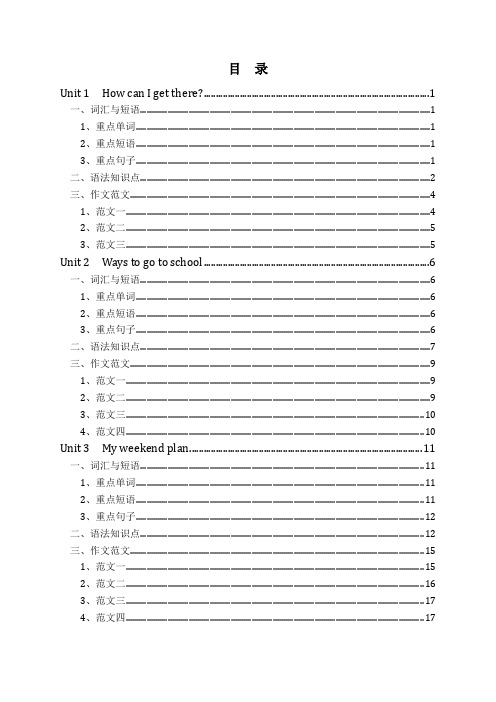
目录Unit 1 How can I get there? (1)一、词汇与短语 (1)1、重点单词 (1)2、重点短语 (1)3、重点句子 (1)二、语法知识点 (2)三、作文范文 (4)1、范文一 (4)2、范文二 (5)3、范文三 (5)Unit 2 Ways to go to school (6)一、词汇与短语 (6)1、重点单词 (6)2、重点短语 (6)3、重点句子 (6)二、语法知识点 (7)三、作文范文 (9)1、范文一 (9)2、范文二 (9)3、范文三 (10)4、范文四 (10)Unit 3 My weekend plan (11)一、词汇与短语 (11)1、重点单词 (11)2、重点短语 (11)3、重点句子 (12)二、语法知识点 (12)三、作文范文 (15)1、范文一 (15)2、范文二 (16)3、范文三 (17)4、范文四 (17)Unit 4 I have a pen pal (18)一、词汇与短语 (18)1、重点单词 (18)2、重点短语 (18)3、重点句子 (18)二、语法知识点 (19)三、作文范文 (23)1、范文一 (24)2、范文二 (24)3、范文三 (25)4、范文四 (25)Unit 5 What does he do (27)一、词汇与短语 (27)1、重点单词 (27)2、重点短语 (27)3、重点句子 (27)二、语法知识点 (28)三、作文范文 (30)1、范文一 (30)2、范文二 (31)3、范文三 (31)Unit 6 How do you feel (32)一、词汇与短语 (32)1、重点单词 (32)2、重点短语 (32)3、重点句子 (32)二、语法知识点 (33)三、作文范文 (34)1、范文一 (35)2、范文二 (35)3、范文三 (35)4、范文四 (35)语法知识点 (37)肯定句如何变否定句 (37)肯定句如何变一般疑问句 (39)划线部分提问(如何变特殊疑问句) (41)写作训练 (43)写作训练答案 (47)Unit 1 How can I get there?一、词汇与短语1、重点单词1.science /ˈsaɪəns/ 科学2.museum /mjuˈziːəm/ 博物馆3.post office /ˈpəʊst ɒfɪs/ 邮局4.bookstore /ˈbʊkstɔː/ 书店5.cinema /ˈsɪnəmə/ 电影院6.hospital /ˈhɒspɪtl/ 医院7.crossing /ˈkrɒsɪŋ/ 十字路口8.turn /tɜːn/ 转湾9.left /left/ 左10.right /raɪt/ 右11.straight /streɪt/ 笔直地12.ask /ɑːsk/ 问13.sir /sɜː(r)/ (对男子的礼貌称呼)先生14.interesting /ˈɪntrəstɪŋ/ 有趣的15.Italian /ɪˈtæliən/ 意大利的16.restaurant /ˈrestrɒnt/ 餐馆17.pizza /ˈpiːtsə/ 比萨饼18.street /striːt]/ 大街;街道19.get /get/ 到达20.gave /ɡeɪv/( give/ɡɪv/的过去式) 给21.follow /ˈfɒləʊ/ 跟着22.tell /tel/ 告诉2、重点短语1.science museum 科学博物馆2.near the library 图书馆附近3.get there 到达那里4.go straight 直走5.turn left/right 向左转/右转6.over there 在那边7.next to the museum 在博物馆旁边8.pet hospital 宠物医院9.Palace museum 故宫博物院10.in front of 在…前面11.behind the post office 在邮局后面12.beside the park 在公园旁边13.be far from 离……很远14.be far from home 远离家乡3、重点句子1. --Where is the museum shop?博物馆商店在哪里--It's near the door. 它在门附近。
人教版新版小学六年级英语上册全册学习资料
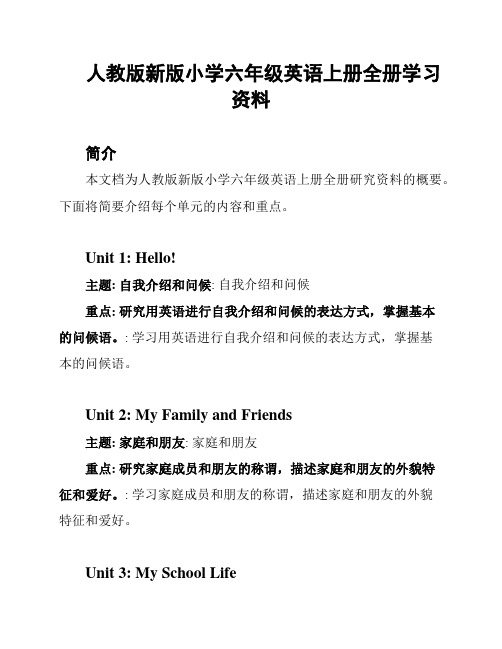
人教版新版小学六年级英语上册全册学习资料简介本文档为人教版新版小学六年级英语上册全册研究资料的概要。
下面将简要介绍每个单元的内容和重点。
Unit 1: Hello!主题: 自我介绍和问候: 自我介绍和问候重点: 研究用英语进行自我介绍和问候的表达方式,掌握基本的问候语。
: 学习用英语进行自我介绍和问候的表达方式,掌握基本的问候语。
Unit 2: My Family and Friends主题: 家庭和朋友: 家庭和朋友重点: 研究家庭成员和朋友的称谓,描述家庭和朋友的外貌特征和爱好。
: 学习家庭成员和朋友的称谓,描述家庭和朋友的外貌特征和爱好。
Unit 3: My School Life主题: 我的校园生活: 我的校园生活重点: 研究描述学校、教室、课程和活动的词汇,了解在校生活中的常见场景。
: 学习描述学校、教室、课程和活动的词汇,了解在校生活中的常见场景。
Unit 4: Leisure Time主题: 休闲时间: 休闲时间重点: 研究谈论休闲活动和爱好,了解并运用动词的ing形式。
: 学习谈论休闲活动和爱好,了解并运用动词的ing形式。
Unit 5: Let's Celebrate!主题: 节日庆祝: 节日庆祝重点: 研究讨论各种节日和庆祝活动,掌握相应的表达方式和词汇。
: 学习讨论各种节日和庆祝活动,掌握相应的表达方式和词汇。
Unit 6: Nature and Environment主题: 自然和环境: 自然和环境重点: 研究描述动物、植物和环境的词汇,了解一些自然保护的知识。
: 学习描述动物、植物和环境的词汇,了解一些自然保护的知识。
总结本册教材包含了六个单元的研究内容,涵盖了日常生活中常见的话题。
通过研究这些内容,学生将能够掌握基本的英语交流能力,并丰富自己的词汇量。
希望本册教材能对学生的英语研究有所帮助。
以上是《人教版新版小学六年级英语上册全册学习资料》的简要介绍。
如需详细内容,请参阅教材。
新人教版PEP小学英语六年级总复习资料(全册)

新人教版PEP小学英语六年级总复习资料(全册)New n PEP Primary School English Grade 6 Review MaterialsI。
Antonymsbig --- smallblack --- XXXfree --- busyhot --- XXXsame --- differentcool --- warmtall --- shortlong --- shortyoung --- oldhere --- therebefore --- afternew --- oldII。
Word n1.CountriesChina。
America。
Australia。
Japan。
England。
Canada。
France2.nalitiesChinese。
American。
Australian。
Japanese。
English。
Canadian。
FrenchnguagesChinese。
Japanese。
English。
French4.SubjectsChinese。
Maths。
English。
Art。
Music。
P.E。
History。
Science5.Days of the WeekSunday。
Monday。
XXX。
XXX。
XXX。
Friday。
Saturday6.SeasonsSpring。
Summer。
XXX。
Winter7.MonthsJanuary。
February。
March。
April。
May。
June。
July。
August。
September。
October。
November。
XXX8.FestivalsSpring Festival。
Dragon Boat Festival。
Mid-Autumn Festival。
New Year's Day。
nal Day。
Children's Day。
Easter。
Halloween。
Christmas.1.植物和水果在我们的生活中,植物和水果是不可或缺的。
人教版六年级英语上册期末重点知识复习资料

人教版六年级英语上册期末重点知识复习资料六年级上册复要点Unit1 How can I get there?一、重点单词:地点:XXXpost office邮局bookstore书店XXX动作:go straight直走turn left/right左转、右转方位:in front of :在···前面behind在···后面near在…旁边XXX紧挨着XXX在旁边over在…上方on the left在左边on the right在右边二、重点句型:(1)Is / Are there…?某处有某物吗?肯定回答:Yes, there is/are.否定回答:No, there XXX’t.(2)Where is the +地址?... ...在那里?It’s +透露表现地址的名词.它... ...例句:Where is the cinema?片子院在哪?It’s XXX在书店的旁边。
(3)How can +主语+get(to)+地址? ... ...怎么到... ...?(如果get背面接的词为副词,则要省略介词to.)例句:我们怎么到那儿?同义句型:Can you tell me the way to +地址?( 4 )Where is +地点?Which is the way to +地点?到书店左转。
Unit 2 Ways to go to school?一、重点单词/短语:交通方式:XXX骑自行车/乘大众汽车/飞机/地铁/火车/船/出租汽车/轮渡take the No.57 bus乘57路大众汽车on foot步行其他:slow down慢下来pay attention to留意traffic lights 交通旌旗灯号灯look right向右看cross the road横穿马路at home在家二、重点句型:(1)How do you come (to) +地点?你们怎么来...的?我通常/经常/有时...How do you go(to) +地点?你们怎么去...的?How do you get (to) +地点?你们怎么到达...的?(频度副词:频度副词又称频率副词,用来表示事情发生的频率,即某事多长时间发生一次。
新部编人教版六年级英语上册重点知识

新部编人教版六年级英语上册重点知识
本文档旨在总结新部编人教版六年级英语上册的重点知识,帮助同学们更好地研究和复。
课文内容
1. 本册英语上册共包括十个单元,每个单元都有相应的课文内容。
同学们需要仔细阅读每个单元的课文,理解其中的主要内容和要点。
2. 课文中重点出现的单词和短语是同学们需要牢记的内容。
通过反复的阅读和默写,加深对这些词汇的理解和记忆。
语法重点
1. 英语语法是研究英语的重要一环,同学们需要掌握本册上涉及的基本语法知识,包括时态、语态、主谓一致等。
2. 了解不同语法规则的使用场景,能够正确运用于实际语境中
是同学们的目标。
句型构造
1. 研究并掌握不同句型的构造方法,能够灵活运用于对话和写
作中。
2. 多做例题和练,积累典型句型的用法和变换方式。
听力训练
1. 听力是英语研究中重要的一部分,同学们需要通过多听录音,培养自己的听力技巧。
2. 同学们可以找到适当的听力材料进行练,提高听力水平。
口语表达
1. 英语口语的开口能力和表达能力是同学们需要加强的部分,需要多加练。
2. 可以通过与同学或老师交流、参加英语角等方式,提高口语表达的能力和自信心。
以上为新部编人教版六年级英语上册的重点知识总结,希望同学们能够根据这些内容进行学习和复习,取得更好的学习效果。
最新人教版(PEP)小学英语六年级上册复习资料

最新人教版(PEP)小学英语六年级上册复习资料Unit 1 How Can I Get There?In this unit。
we will learn some XXX.1.Key Vocabulary:museum: a place where you can see art。
historical objects。
or XXXbookstore: a shop where you can buy bookscinema: a place where you can watch moviesturn: to change nhospital: a place where you can receive medical treatmentleft: the opposite of rightpost office: a place where you can send and receive letters and packagesscience: the study of the natural worldright: the opposite of leftstraight: in a direct linecrossing: a place where two or more roads meeteful Phrases:post office: the place where you can send and receive letters and packagesscience museum: a museum where you can learn about scienceXXX animalsXXX: XXX foodXXX: a park in BeijingPalace Museum: a museum in Beijinggo straight: XXXturn right/left: to change n to the right or leftnext to: beside or near somethingin front of: located before or ahead of somethingnear the park: close to the parkXXX: XXXmon ns:Excuse me: a polite way to get someone's nFollow me。
(完整版)小学六年级人教版英语总复习及知识点
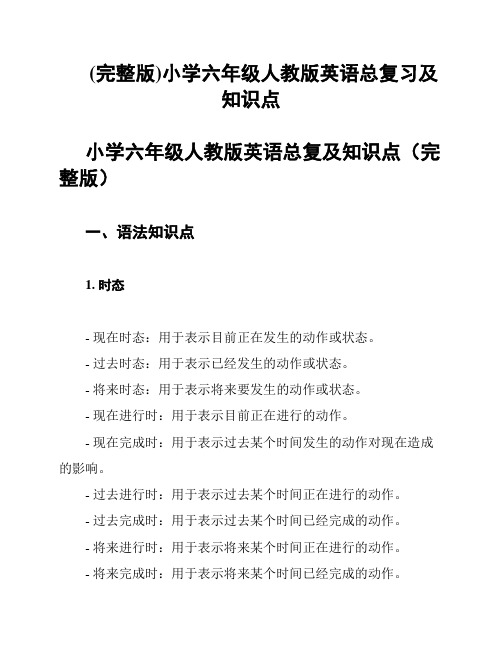
(完整版)小学六年级人教版英语总复习及知识点小学六年级人教版英语总复及知识点(完整版)一、语法知识点1. 时态- 现在时态:用于表示目前正在发生的动作或状态。
- 过去时态:用于表示已经发生的动作或状态。
- 将来时态:用于表示将来要发生的动作或状态。
- 现在进行时:用于表示目前正在进行的动作。
- 现在完成时:用于表示过去某个时间发生的动作对现在造成的影响。
- 过去进行时:用于表示过去某个时间正在进行的动作。
- 过去完成时:用于表示过去某个时间已经完成的动作。
- 将来进行时:用于表示将来某个时间正在进行的动作。
- 将来完成时:用于表示将来某个时间已经完成的动作。
2. 语法结构- 名词:用于表示人、动物、物体、地点等。
- 动词:用于表示动作或状态。
- 形容词:用于描述名词的特征或状态。
- 副词:用于修饰动词、形容词或其他副词。
- 介词:用于表示位置、时间或关系等。
- 代词:用于替代名词。
- 数词:用于表示数量。
- 冠词:用于限定名词的范围。
- 连词:用于连接词语、短语或句子。
3. 句子结构- 主语:句子中执行动作或承受动作的人或事物。
- 谓语:句子中说明主语动作或状态的部分。
- 宾语:句子中接受动作的人或事物。
- 定语:用于修饰名词或代词的成分。
- 状语:用于修饰动词、形容词、副词或整个句子的成分。
- 表语:用于说明主语的状态或特征的部分。
二、总复内容1. 单词- 请根据教材中的单词表,复并牢记相关的单词拼写和意思。
2. 句子- 复教材中的对话和句子,理解并掌握其基本意思和用法。
3. 对话- 复教材中的对话,掌握其中的日常生活用语和表达方式。
4. 语法- 复教材中的语法知识点,加深对时态、语法结构和句子成分的理解。
三、研究方法1. 多听多说- 多听英语教材、歌曲或英语广播,提高听力水平。
- 多说英语,练口语表达和语音准确性。
2. 多读多写- 多读英语教材、故事书等,提高阅读理解能力。
- 多写英语作文,锻炼自己的写作能力和语法运用。
最新人教版小学英语六年级上册期末复习知识点总结(全册)

最新人教版小学英语六年级上册期末复习知识点总结(全册)Unit 1Vocabulary- Greetings: hello, hi, good morning, good afternoon, good evening - Countries and nationalities: America, England, China, Japan, Mexico, Australia, Russian- Numbers: 1-20Grammar- Be verb (am, is, are): subject pronouns (I, you, he, she, it, we, they) - Question words: what, where, who, how- Plural nounsUnit 2Vocabulary- Sports: soccer, baseball, basketball, table tennis, swimming- Colors: red, green, blue, yellow, white, black, pink, purpleGrammar- Present continuous tense (am/is/are + verb + ing)- Demonstrative pronouns (this, that, these, those)Unit 3Vocabulary- Subjects: math, English, Chinese, science, music, art, P.E.- School items: pens, pencils, books, rulers, erasers, pencil cases, backpacksGrammar- Can (ability): affirmative, negative, and interrogative forms- Frequency adverbs: always, usually, sometimes, neverUnit 4Vocabulary- Food: bread, noodles, eggs, rice, dumplings, ice cream- Fruits: apples, bananas, oranges, grapes, strawberries, watermelonsGrammar- Countable and uncountable nouns- How much (asking about quantity for uncountable nouns)- How many (asking about quantity for countable nouns)Unit 5Vocabulary- Weather: sunny, cloudy, windy, rainy, snowy- Seasons: spring, summer, autumn, winterGrammar- Simple present tense: affirmative/negative/interrogative forms - Adverbs of frequency: always, usually, sometimes, neverUnit 6Vocabulary- Animals: cat, dog, rabbit, duck, mouse, bird, monkey- Body parts: head, eye, nose, mouth, ear, hand, footGrammar- There be (there is/there are): affirmative/negative/interrogative forms- Possessive 's: showing ownershipUnit 7Vocabulary- Occupations: teacher, doctor, driver, cook, police officer, singer, dancer- Rooms: living room, bedroom, bathroom, kitchenGrammar- Simple present tense: affirmative/negative/interrogative forms- Prepositions of place: in, on, under, behind, in front ofUnit 8Vocabulary- Transportation: bike, car, bus, train, subway, plane- Directions: left, right, forward, backwardGrammar- Imperative sentencesThis is a summary of key vocabulary and grammar points from each unit in the textbook. Happy studying and good luck on your exams!。
最新新人教版英语六年级上册知识点总结

最新新人教版英语六年级上册知识点总结Unit 2 Ways to go to school 一.知识点归纳(一)、词汇四会bike ( 自行车) by ( 乘坐) slow down 慢下来bus (公共汽车) foot (脚)stop 停下来train (火车) how (怎样)plane ( 飞机) go to school (上学)ship (轮船) taxi 出租车ferry 轮渡sled 雪橇subway ( 地铁) (交通工具前加by ,表示乘坐,但步行要用on foot )交通工具traffic tools 其他 2 (二)、重点句型①询问交通方式用疑问代词——你怎样去/来上学?——我走路去/来上学. ——How does your father go to work ? 你父亲怎样去上班?——He goes to work by subway . 他坐地铁去上班. ②询问地点,用疑问代词where Where is your home ? 你家在哪里?It’s near the post office . 在邮局旁边. Where are the teachers ? 老师们在哪儿They are in the teacher’s office .在老师的办公室. ③问路:How can I get to the Fuxing Hospital? 我怎么去福星医院?You can take the No .1 bus . 你可以乘坐1路公交车. ④交通规则(traffic rules ):Stop and wait at a red light . 红灯停Go at a green light . 绿灯行Slow down and stop at a yellow light . 黄灯停⑤You must drive slowly. You must wear a life jacket. You must stop at a red light 你必须开慢点. 你必须穿救生衣. 你必须在红灯时停. Don’t go at a red light. Don’t run on the ferry. Don’t let the dogs run too fast. 不要在红灯时走. 不要在轮渡上奔跑. 不要让狗跑的太快. Unit 3 My weekend plan 一、知识点归纳(一)、词汇四会next week /weekend 下周/ 周末newspaper 报纸this morning 今天上午漫画书Time this afternoon 今天下午word book 单词书(时间) this evening 今天晚上this weekend 这个周末dictionary 字典tonight 今夜tomorrow 明天post card 明信片take a trip 去旅游theme park 主题公园activities see a film 看电影others pet shop 宠物店(活动)go to the supermarket 去看电影(其他)supermarket 超市visit my grandparents 参观祖父母shoe store 鞋店二、重点句式和句型:本单元中出现的一个重点语法是一般将来时:表示将要发生的动作或状态,常和表示将来的时间连用. 构成:陈述肯定句:主语+ be going to + 动词原形+ 其他例子I am going to (go to) the bookstore by bus this afternoon. He/ She is going to take a trip by train this weekend. We/ They are going to see a film tonight. 3 否定句:主语+ be + not going to +动词原形+其他例子I am not going to (go to) the bookstore by bus this afternoon. He/ She is not going to take a trip by train this weekend. We/ They are not going to see a film tonight. 一般疑问句:Be+ 主语+ going to +动词原形+其他? 例子:Are you going to the bookstore by bus this afternoon? Yes,I am . No,I’m not. Is he/ She going to take a trip by train this weekend?Yes,he/ She is. No,he/ She isn’t. Are we/ they going to see a film tonight? Yes,we/ they are. No,we/ they aren’t. 特殊疑问句:特殊疑问词+ 一般疑问句?例子:What are you going to do this afternoon? Where are you going this afternoon? How are you going to the bookstore this afternoon? When are you going to the bookstore by bus? (以上特殊疑问句中are you 可以替换为is he ,is she,are they,are we等) 三、重点句型: 1. we’re going to see a film about space trael! 我们将要去看关于火星之旅的电影.2. We are going to draw some pictures in Renmin Park.我们打算去人民公园画一些画.3. Havea good time!玩的愉快. 4. ----What are you going to do in the future? 你将来想干什么?----I’m going to be a science teacher one day. 或I want to be a science teacher one day. 我想将来有一天当科学老师. Unit 4 I have a pen pal 本单元的重点是谈论某人的兴趣爱好,语法是动词的-ing形式和动词的第三人称单数形式. 一、词汇:dance (dancing) 跳舞sing (singing ) 唱歌hobby play football (playing football) 踢足球(爱好)read story (reading stories ) 看故事hobbies do kung fu (doing kung fu ) 练武术live (lives) in Shiyan 住在十堰like (likes) 喜欢teach (teaches) English 教英语study ( studies Chinese 学习汉语) go (goes) hiking 去远足cook (cooks ) Chinese food 制作中国食物) 第三人单数watch (watches) TV 看电视read (reads) newspaper读报纸do (does) word puzzles 猜字谜二、句型:1.询问某人的兴趣爱好:①----What’s your hobby?(单数句式) What are your hobbies?(复数句式)你的爱好是什么?----I like reading stories and singing. 我喜欢读故事书和唱歌. I also like…我也喜欢…②---- What’s Peter’s (his) / Amy’s (her) hobby? (单数句式) What are Peter’s (his) / Amy’s (her) hobbies? (复数句式)---- He / She likes reading stories and singing. 他/ 她喜欢读故事书和唱歌 4 2. 表示征求别人意见:Can I also be his pen pal? 我也可以做他的笔友吗?Sure.当然. 三、语法用法:(1)表达喜欢做某事,通常要用动词的-ing 形式,即:like doing sth. 如:like singing / playing football / listening to music / playing the pipa / watching TV等(2)一般现在时的用法表示经常或习惯性的动作或状态,常与every day /morning /evening ,often,usually,always,sometimes 等状语连用. 如:We do morning exercises every day. He usually goes to school by bike. 结构:肯定句:主语+动词+其他. 如:Miss white teaches English. 否定句:主语+don’t/doesn’t +动词+其他如:Miss white doesn’t teach English. 一般疑问句:Do/ Does +主语+ 动词原形+其他?如:Does Miss White teach English? 肯否定回答:Yes,she does ./ No,she doesn’t . 备注:第三人称单数用does,doesn’t. 没有does,doesn’t 时动词必须要有变化. 四、语法记忆小锦囊★一般现在时用法记忆歌:肯定句的现在式,不是三单用原形,要是三单就加s,es,若是否定疑问句,没有be就加个do,碰到三单加does. 如把does加在前,动词就要还原形. ★第三人称单数记忆小诀窍:我不能S,你不能S,他们她们它们、大家都不能S. 谁S?他她它S. Unit 5 What does he do ? 一、知识点归纳(一)词汇四会singer (歌手) writer ( 作家) Hong Kong ( 香港) head teacher 校长dancer 舞蹈家sea (大海)worker ( 工人) cleaner 清洁工factory ( 工厂) postman ( 邮递员) driver 司机stay ( 保持) businessman ( 商人) secretary 秘书university (大学) football player 足球运动员help ( 帮助) fisherman (渔民) money (金钱) scientist ( 科学家) gym ( 体育馆) police officer (警察) use ( 使用pilot ( 飞行员) type ( 打字) coach (教练) cook(厨师)quickly ( 迅速地) (二)重点句型职业job 三会 5 ①询问职业What does he(she) do ?/What is he(she) ?/What’s his(her) job? 他是做什么的?He/ She is a doctor. 他是一个医生. What do you do ?/What are you ? / What’s your job? 你是做什么的?I ’m a student . 我是一个学生.②询问工作的地点Where do you work ? 你在哪儿工作?I work in a school . 我在一个学校工作. Where does she / your mother work ? 她/ 你妈妈在哪儿工作?上词可替换. She works in a hospital . 她在一个医院工作. 一般疑问句:Does he work in a factory ? 他在工厂工作吗Yes ,he does . 是的.③询问怎样去工作How does your father go to work ? 你父亲怎么去上班?上词可替换. He goes to work by car . 他开车去上班. ④He works very hard and stays healthy. 他工作很努力而且保持健康. We should study hard and stay healthy. 我们应该努力学习并且保持健康. healthy life 健康生活lots of fish 许多鱼other cuntries 其他国家Unit 6 How do you feel? 重点单词:angry 生气的see a doctor 看病afraid 害怕的take a deep breath 深吸一口气情绪sad 难过的count to ten 数到十worried 担心的wear warm clothes 穿暖点happy 高兴地do more exercise 多锻炼重要句型: 1、They’re afraid of him. 他们害怕它. 2、The cat is angry with him. 这只猫很生他们的气. 3、What’s wrong ? Your father is ill. 怎么了?你爸爸病了. 4、Don’t be sad . 别伤心. 5、How do you feel ?你感觉怎么样?I am sad. 或I feel sad. 我很难过. How does Oliver / Amy / XX feel ? He / She is …. 或He / She feels …6、What should I / he / she / XX do ? 我/他/她/某人应该怎么做?You / He / She should + 动词原形(表示建议)你/他/她应该…。
人教版小学六年级英语上册知识点总结和复习要点
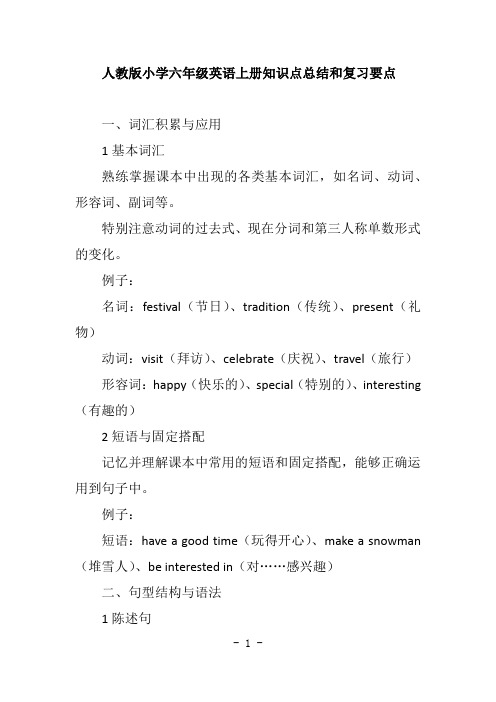
人教版小学六年级英语上册知识点总结和复习要点一、词汇积累与应用1基本词汇熟练掌握课本中出现的各类基本词汇,如名词、动词、形容词、副词等。
特别注意动词的过去式、现在分词和第三人称单数形式的变化。
例子:名词:festival(节日)、tradition(传统)、present(礼物)动词:visit(拜访)、celebrate(庆祝)、travel(旅行)形容词:happy(快乐的)、special(特别的)、interesting (有趣的)2短语与固定搭配记忆并理解课本中常用的短语和固定搭配,能够正确运用到句子中。
例子:短语:have a good time(玩得开心)、make a snowman (堆雪人)、be interested in(对……感兴趣)二、句型结构与语法1陈述句复习并巩固陈述句的基本结构,能够正确构建和表达完整的句子。
例子:陈述句:I like playing football in the afternoon.(我喜欢下午踢足球。
)2疑问句学习和掌握特殊疑问句、一般疑问句及其回答方式,能够准确理解并回答问题。
例子:特殊疑问句:What do you usually do on your birthday?(你生日通常做什么?)回答:I usually have a birthday party with my friends.(我通常和朋友们一起举办生日派对。
)3祈使句巩固祈使句的基本用法,能够正确使用祈使句表达请求、命令或建议。
例子:祈使句:Please don’t forget to bring your homework tomorrow.(请别忘了明天带作业来。
)4时态复习并巩固一般现在时、一般过去时、一般将来时和现在进行时等时态的基本用法和形式。
例子:一般现在时:She often reads books after dinner.(她晚饭后经常看书。
)一般过去时:We went to the zoo last weekend and saw many animals.(我们上周末去了动物园,看到了很多动物。
完整版)【人教版】小学六年级英语上册总复习
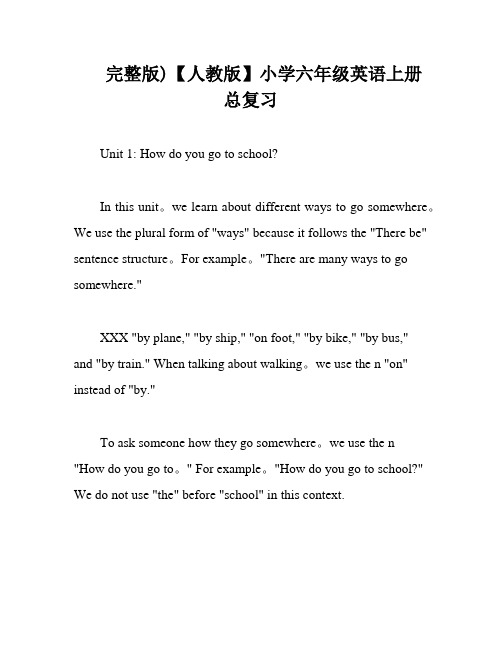
完整版)【人教版】小学六年级英语上册总复习Unit 1: How do you go to school?In this unit。
we learn about different ways to go somewhere。
We use the plural form of "ways" because it follows the "There be" sentence structure。
For example。
"There are many ways to go somewhere."XXX "by plane," "by ship," "on foot," "by bike," "by bus,"and "by train." When talking about walking。
we use the n "on" instead of "by."To ask someone how they go somewhere。
we use the n "How do you go to。
" For example。
"How do you go to school?" We do not use "the" before "school" in this context.We also learn about traffic lights and traffic rules。
We use "at a red light," "Wait at a yellow light," and "Go at a green light" to describe traffic light signals.To ask about ns。
最新人教版小学英语六年级上册复习资料
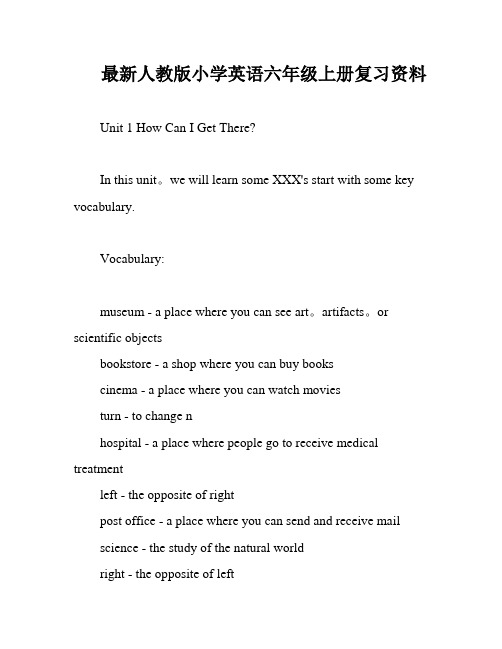
最新人教版小学英语六年级上册复习资料Unit 1 How Can I Get There?In this unit。
we will learn some XXX's start with some key vocabulary.Vocabulary:museum - a place where you can see art。
artifacts。
or scientific objectsbookstore - a shop where you can buy bookscinema - a place where you can watch moviesturn - to change nhospital - a place where people go to receive medical treatmentleft - the opposite of rightpost office - a place where you can send and receive mailscience - the study of the natural worldright - the opposite of leftstraight - in a direct linecrossing - a place where two or more roads meetWe will also learn some common phrases for giving and following ns.Phrases:post office - next to the bookstorescience museum - near the hospitalpet hospital - XXXItalian restaurant - in front of the schoolBeihai Park - near the parkPalace Museum - over therego straight - continue in the same nturn right/left - change n to the right/leftnext to - besidein front of - located beforenear the park - close to the parkXXX - XXXWe will also XXX.XXX Structures:1.Where is the + n。
人教版英语最新六年级上册学习资料

人教版英语最新六年级上册学习资料概述本文档旨在提供人教版英语最新六年级上册的研究资料,帮助学生更好地研究和掌握英语知识。
单元一:Hello!- 单元介绍:本单元主要以问候和自我介绍为主题,让学生研究如何用英语进行简单的问候和自我介绍。
- 研究资料:包括课本教材、练册、听力材料等。
单元二:My Family- 单元介绍:本单元主要以家庭为主题,让学生研究如何用英语介绍自己的家庭成员和家庭情况。
- 研究资料:包括课本教材、练册、听力材料等。
单元三:School Life- 单元介绍:本单元主要以学校生活为主题,让学生研究如何用英语描述自己的学校生活和研究情况。
- 研究资料:包括课本教材、练册、听力材料等。
单元四:Happy Holidays- 单元介绍:本单元主要以节假日为主题,让学生研究如何用英语描述自己的节假日活动和体验。
- 研究资料:包括课本教材、练册、听力材料等。
单元五:On the Farm- 单元介绍:本单元主要以农场为主题,让学生研究如何用英语描述农场的动植物和相关活动。
- 研究资料:包括课本教材、练册、听力材料等。
单元六:At the Zoo- 单元介绍:本单元主要以动物园为主题,让学生研究如何用英语描述动物园中的各种动物和相关场景。
- 研究资料:包括课本教材、练册、听力材料等。
单元七:My Hobbies- 单元介绍:本单元主要以爱好为主题,让学生研究如何用英语介绍自己的兴趣爱好以及相关活动。
- 研究资料:包括课本教材、练册、听力材料等。
单元八:Health and Fitness- 单元介绍:本单元主要以健康与健身为主题,让学生研究如何用英语描述保持健康和健身的方法和活动。
- 研究资料:包括课本教材、练册、听力材料等。
总结本文档提供了人教版英语最新六年级上册的学习资料概述,每个单元的主题和相关学习资料都有详细介绍。
希望这份资料能够帮助学生们更好地学习英语,提升他们的语言能力和交流能力。
人教版英语最新六年级上册复习资料
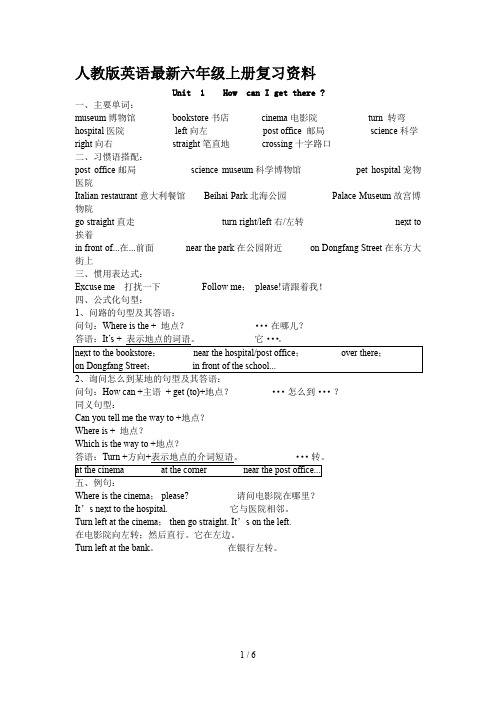
人教版英语最新六年级上册复习资料Unit 1 How can I get there ?一、主要单词:museum博物馆bookstore书店cinema电影院turn 转弯hospital医院left向左post office 邮局science科学right向右straight笔直地crossing十字路口二、习惯语搭配:post office邮局science museum科学博物馆pet hospital宠物医院Italian restaurant意大利餐馆Beihai Park北海公园Palace Museum故宫博物院go straight直走turn right/left右/左转next to 挨着in front of...在...前面near the park在公园附近on Dongfang Street在东方大街上三、惯用表达式:Excuse me 打扰一下Follow me;please!请跟着我!四、公式化句型:1、问路的句型及其答语:问句:Where is the + 地点?···在哪儿?答语:It’s + 表示地点的词语。
它···。
next to the bookstore;near the hospital/post office;over there;on Dongfang Street;in front of the school...2、询问怎么到某地的句型及其答语:问句:How can +主语+ get (to)+地点?···怎么到···?同义句型:Can you tell me the way to +地点?Where is + 地点?Which is the way to +地点?答语:Turn +方向+表示地点的介词短语。
···转。
新人教版六年级英语上册复习要点

新人教版六年级英语上册复习要点新人教版六年级英语上册复习要点Unit 1 How can I get there?基本句型:1. A: Excuse me. Can you help me? 打扰一下,你能帮我忙吗?B: Sure. 当然可以。
A: Where is the restaurant,please? 请问饭店在哪里?B: It's next to the park on Dongfang Street. 在东方大街上的医院隔壁。
A: How can I get there? 我怎么才能到那里呢?B: Go straight. Turn left at the bookstore. Then turn right at the hospital.笔直走,在书店门口向左拐,然后在医院门口向右拐。
A: Thank you very much. 非常感谢。
B: You're welcome. 不客气。
2.It's over there. 它在那边。
3.I want to buy a postcard. 我想买一张明信片。
4.I want to send it today. 我想今天把它寄出去。
5.I don't know. 我不知道。
6.I'll ask. 我去问问。
7.What a great museum! 好大的博物馆啊!8.What an interesting film! 多有趣的一部电影啊!9.I'm hungry now. 我现在饿了。
10.I know a great Italian restaurant. 我知道一家很不错的意大利饭店。
11.Let' go! 走吧!12.Wu Yifan's grandpa gave Robin a new feature. He now has GPS.吴一帆的爷爷给罗宾一个新的功能。
最新人教版(PEP)小学英语六年级上册复习资料教案资料

人教版(PEP)小学英语总复习六年级上册知识点Unit 1 How can I get there ?一、主要单词:museum博物馆bookstore书店cinema电影院turn 转弯hospital医院left向左post office 邮局science科学right向右straight笔直地crossing十字路口二、习惯语搭配:post office邮局science museum科学博物馆pet hospital宠物医院Italian restaurant意大利餐馆go straight直走turn right/left右/左转next to 紧挨着near the park在公园附近in front of...在...前面on Dongfang Street在东方大街上三、惯用表达式:Excuse me. 打扰一下。
Follow me, please!请跟着我!四、句型:1、问路的句型及其答语:问句:Where is the + 地点?···在哪儿?答语:It’s + 表示地点的词语。
它在···。
next to the bookstore, near the hospital/post office, over there,on Dongfang Street, in front of the school...2、询问怎么到某地的句型及其答语:问句:How can +主语+ get (to)+地点?···怎么到···?例句:How can I get to ZhongShan park?How can I get there?同义句型:Can you tell me the way to +地点?Where is + 地点?Which is the way to +地点?答语:Turn +方向(left/right)+表示地点的介词短语。
- 1、下载文档前请自行甄别文档内容的完整性,平台不提供额外的编辑、内容补充、找答案等附加服务。
- 2、"仅部分预览"的文档,不可在线预览部分如存在完整性等问题,可反馈申请退款(可完整预览的文档不适用该条件!)。
- 3、如文档侵犯您的权益,请联系客服反馈,我们会尽快为您处理(人工客服工作时间:9:00-18:30)。
人教版(PEP)小学英语总复习六年级上册知识点Unit 1 How can I get there ?一、主要单词:museum博物馆bookstore书店cinema电影院turn 转弯hospital医院left向左post office 邮局science科学right向右straight笔直地crossing十字路口二、习惯语搭配:post office邮局science museum科学博物馆pet hospital宠物医院Italian restaurant意大利餐馆Beihai Park北海公园Palace Museum故宫博物院go straight直走turn right/left右/左转next to 挨着in front of...在...前面near the park在公园附近on Dongfang Street在东方大街上三、惯用表达式:Excuse me 打扰一下Follow me, please!请跟着我!四、公式化句型:1、问路的句型及其答语:问句:Where is the + 地点?···在哪儿?答语:It’s + 表示地点的词语。
它···。
问句:How can +主语+ get (to)+地点?···怎么到···?同义句型:Can you tell me the way to +地点?Where is + 地点?Which is the way to +地点?五、例句:Where is the cinema, please? 请问电影院在哪里?It’s next to the hospital. 它与医院相邻。
Turn left at the cinema, then go straight. It’s on the left.在电影院向左转,然后直行。
它在左边。
Turn left at the bank。
在银行左转。
Unit 2 Ways to go to school一、主要单词:by乘bus公共汽车on foot步行plane飞机taxi出租车ship(大)船subway地铁train火车slow慢的stop停下 always 总是,一直 usually 通常often经常sometimes 有时候 never 从来不二、习惯语搭配:by bike/bus/plane/subway/train/ship/taxi/ferry骑自行车/乘公共汽车/飞机/地铁/火车/船/出租汽车/渡轮take the No.57 bus乘57路公共汽车on foot步行slow down慢下来pay attention to注意traffic lights 交通信号灯look right向右看cross the road横穿马路get off下车at home在家traffic rules交通规则 get to到达get on 上车be far from…表示离某地远三、惯用表达式:Wait!等一等!Hooray太好了!I see. 我明白了。
Go at a green light 绿灯行Stop at a red light 红灯停Wait at a yellow light 黄灯等四、公式化句型:1、如何询问对方的出行方式:How do you come(to)+地点?你(们)怎么来···的?2、如何用must表示必须做某事:某人+must+动词原形(+其它). ···必须···。
3、告诫别人不要做某事的句型:Don’t +动词原形(+其它). .不要/别···。
五、例句:How do you go to school? 你怎么去上学?Usually I go to school on foot. Sometimes I go by bus.通常我步行去上学。
有时候骑自行车去。
How can I get to Zhongshan Park ? 我怎么到达中山公园?You can go by the No. 15 bus. 你可以坐15路公共汽车去。
I am far from school now. 我现在离学校很远。
My home is not far from our school. My home is near our school.我家离学校不远。
Unit 3 My weekend plan一、主要单词:tomorrow明天film电影supermarket超市trip旅行tonight在今晚evening晚上/傍晚next week下周comic连环画杂志dictionary词典word单词post card明信片visit拜访二、习惯搭配:take a trip去旅行go for a picnic去野餐go to the cinema去看电影learn to swim学习游泳visit my grandparents看望我(外)祖父母get together 聚会go to the supermarket去超市go ice-skating去滑冰make a snowman堆雪人see a film看电影make mooncakes做月饼read a poem朗诵一首诗this weekend这周末Renmin Park人民公园next week下周this morning/afternoon/evening今天上午/下午/晚上next Wednesday下星期三三、惯用表达式:What about you?你呢?Here they are!它们在这儿!Can I help you?我能帮助你吗?Sounds great!听起来很棒!Have a good time!玩得开心!You too.你也是四、公式化句型:1、询问对方打算做什么的句型及其答语:问句:What are you going to do +其它?你/你们···打算做什么?答语:I’m/We’re going to +动词(短语)原形+其它. 我/我们打算···。
问句:Where are you going(+将来时间)? 你/你们打算(···)去哪儿?答语:I’m/We’re going (to the)+地点. 我/我们打算去···。
3、询问对方打算何时去做某事的句型及答语:问句:When are you going to +动词(短语)原形?你/你们打算什么时候···?答语:I’m/We’re going to +动词(短语)原形+将来时间. 我/我们打算···。
五、例句:What are you going to do on the weekend? 你周末打算做什么?I’m going to visit my grandparents this weekend? 这个周末我打算去看望我的外祖父母。
Where are you going this afternoon? 你今天下午打算去哪里?I’m going to the bookstore. 我打算去书店。
What are you going to buy? 你打算去买什么?I’m going to buy a comic book。
我打算去买一本漫画书。
Unit 4 I have a pen pal一、主要单词:studies学习(第三人称单数形式)puzzle谜hiking远足二、习惯搭配:read stories读故事do kungfu练功夫fly kites放风筝play the pipa弹琵琶play sports进行体育活动climb mountains爬山listen to music听音乐sing English songs唱英文歌on a farm在一个农场里live in...住在···write an email to...给···写一封电子邮件on the playground在运动场上三、惯用表达式:Me too.我也是。
Really?真的吗?四、公式化句型:1、询问某人爱好的句型及其答语:问句:What are sb.’s hobbies? ···有什么爱好?答语:主语+like/likes+动词-ing形式(+其它). ···喜欢···。
2、由do/does引导的一般疑问句及其答语:问句:Do/Does+主语+动词原形+其它?答语:Yes,主语+do/does. /No,主语+don’t/doesn’t.五、语法:1、动词变为动名词的规则:动词变为动名词,即是动词加ing。
一般要遵循以下三条规则:(1)一般情况下,在动词的后面直接加ing。
如:play—playing read—reading do—doing go—going(2)以不发音的字母e结尾的动词,要去掉不发音的字母e,再加ing。
如:write—writing ride—riding make—making dance—dancing(3)以单元音加单辅音结尾的重读闭音节,要双写最后一个辅音字母,再加ing。
如:run—running swim—swimming put—putting sit—sitting2、关于第三人称单数:动词变为第三人称单数形式的规则:(1)在一个句子中,如果主语人称既不是你,也不是我,而是另外的一个人,这时的人称叫做第三人称单数。
(2)在第三人称单词的句子中,动词要使用第三人称单词形式。
(3)动词变为第三人称单数形式,要遵循以下规则:①一般情况下,在动词的后面直接加s。
如:read--reads make—makes write—writes②以字母s, x, o , sh , ch结尾的动词,在词尾加es。
如:do—does wash—washes teach—teaches go—goes pass—passes③以y结尾的动词分为两个情况,以元音字母加y结尾的动词,在词尾直接加s。
如:play —plays buy--buys以辅音字母加y结尾的动词,要把y变为i,再加es.如:study--studies④以f , fe结尾的名词,先把f,fe变为v,再加-es.⑤特殊变化:have--has(4)在一个第三人称单数的句子中,只要句子中出现了does或者其否定形式doesn’t.该句子中的其他动词就要使用原形。
